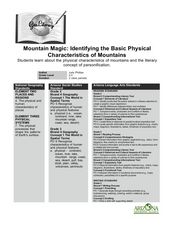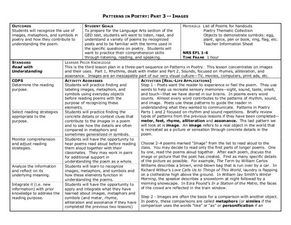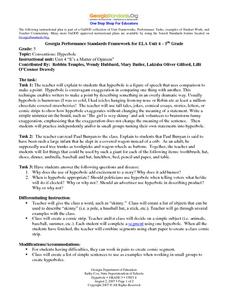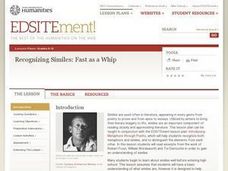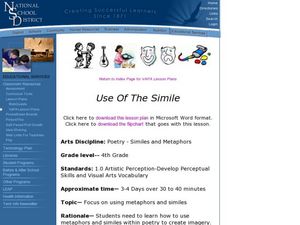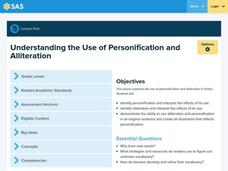Curated OER
Mountain Magic: Identifying the Basic Physical Characteristics of Mountains
Students read about and identify on maps the physical characteristics of mountains. In this mountains lesson plan, students also write about the characteristics using personification.
Curated OER
Patterns In Poetry: Images (Part 3)
Students explore imagery in poetry. For this poetry lesson, students examine how the use of metaphors and similes aid in reading comprehension. Multiple resources are provided.
Curated OER
Using Onomatopoeia to Tell the Story of an Imaginary Field Trip
Young scholars explore language arts by utilizing word choice to compose a paragraph. In this phonetics lesson, students discuss the importance of a "voice" in their writing as they read the book Rattletrap Car. Young scholars write...
Curated OER
Similes
A simile is a non literal phrase that needs to be deciphered for contextual meaning. Similes are also fun to read and write. Third graders get cozy with similes found in the book If You Hopped Like a Frog by David M. Schwartz. They use...
Curated OER
Personification
Second graders recognize personification in texts. In this personification lesson plan, 2nd graders discuss figurative language and how characters can be given human-like qualities. Students read a story and write down examples they...
Curated OER
Lesson 1: Figurative Language
The story Once in a Blue Moon by Nicola Morgan is full of figurative language. Second graders choose one idiom from the story and create an illustration of its meaning. Handouts and structured vocabulary practice is included with the...
Curated OER
Lesson Three: Go Free or Die
Fourth graders look for sensory details and figurative language. In this reading strategy lesson, 4th graders read the story Go Free or Die by J. Ferris and complete a chart with figurative language. They use a word wall in the class to...
Curated OER
Happy and Sad
In this English idioms and metaphors worksheet, middle schoolers discover the metaphorical meaning of words and phrases associated with happiness and sadness. Students work in pairs to role play a conversation about things that make...
Curated OER
Similes and Metaphors Information
In this similes and metaphors worksheet, learners write a descriptive practice paragraph in which they describe a place, idea, person, event, or concept without telling what the subject of the paragraph is. Students then pair up to try...
Curated OER
Notes- Similes 2
In this simile instructional activity, students read definitions, paragraphs, and examples that contain similes. Students complete 8 sections to read and explain.
Curated OER
Animal Similes
In this English worksheet, students use animals in similes. Students fill in the blanks with the names of animals. The subjects of the sentences are compared to animals.
Curated OER
English Exercises: Similes
For this English exercises: similes worksheet, 6th graders read the explanation and examples of similes, then interactively fill in 15 sentences using similes, with immediate online feedback.
Curated OER
Creating Poetic Devices
In this creating poetic devices instructional activity, 9th graders create 5 original examples of poetic techniques by listing and defining each term, then illustrating that example; a list of terms and an example are shown; a grading...
Curated OER
Chef for a Day
Students make chocolate chip cookies. In this cooking lesson, students follow a recipe by doing each step in sequence.
Curated OER
Onomatopoeia
Fifth graders investigate onomatopoeia. In this reading lesson, 5th graders create a list of onomatopoeic words from books read and brainstorm words of their own in small groups.
Curated OER
Conventions: Hyperbole
Fifth graders discuss hyperbole. For this language arts lesson, 5th graders understand that hyperbole enables writers to make a point by describing something in an overly dramatic way. Students create a list of objects that can be used...
Curated OER
Sayings Quiz: Mixed 1
In this English sayings worksheet, students complete a ten question multiple choice online interactive quiz about the meaning of common sayings. Example: A bad penny always turns up.
Curated OER
It's Raining Cats and Dog: Studying Idioms
Seventh graders determine the literal and figurative meanings of idioms and research the history of idioms. In this idioms lesson, 7th graders read two books by Fred Gwynne and select two idioms from the texts to research. Students...
Curated OER
Recognizing Similes: Fast as a Whip
Students review basic knowledge of similes and engage with similes on a more abstract level. In this similes activity, students define similes and identify examples. Students read and analyze the similes used in poetry by Derricotte,...
Curated OER
Metaphors in Literature
Eighth graders analyze literature and the use of metaphors. In this metaphors lesson, 8th graders view and discuss the examples of metaphors. Students complete the phrases by writing in a metaphor.
Curated OER
Literature Book: Rat-a-tat-tat
Students explore choral reading. In this oral reading lesson, students listen to the book Rat-a-tat-tat by Jill Eggleton and participate by reading certain parts chorally and adding sound effects with instruments and noise makers.
Curated OER
Focus On Figurative Language in Prose
Students examine the use of literary prose in the story, "Dark They Were, and Golden-Eyed." In this literary prose lesson, students investigate the use of imagery, metaphor, and simile in the story. They tell how author's purpose is...
Curated OER
Use of the Simile
Fourth graders identify and write their own similes. In this literary devices instructional activity, 4th graders define and identify similes. The teacher scaffolds the instructional activity so that all students can write their own...
Curated OER
Review of Personification and Alliteration
Young scholars study personification and alliteration in various fiction texts. In this literary devices lesson, students use various texts to identify the literary devices of personification and alliteration. Young scholars use examples...


